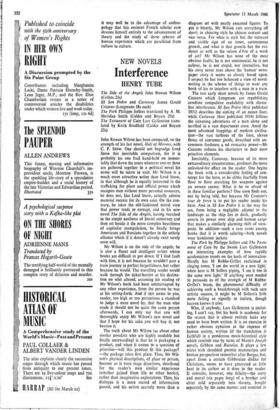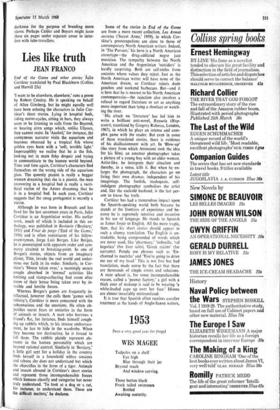NEW NOVELS
Interference
HENRY TUBE
The Side of the Angels John Rowan Wilson (Collins 25s) SS San Pedro and Castaway James Gould Cozzens (Longmans 18s each) The Park Philippe Sollers translated by A. M. Sheridan Smith (Calder and Boyars 25s) The Testament of Cain Lars Gyllensten trans- lated by Keith Bradfield (Calder and Boyars 25s)
John Rowan Wilson has been compared, on the strength of his last novel, Hall of Mirrors, with C. P. Snow. One should not begrudge Lord Snow this inevitable comparison, for it is probably his one frail hand-hold on immor- tality that down the years wherever two or three are gathered together in a political novel his name will be taken in vain. Mr Wilson is a much more attractive writer than Lord Snow, in that although he is equally interested in the trafficking for place and official power which occupies men without more personal resources, he does not, like Lord Snow, actually admire material success for its own sake. On the con- trary, he takes the old-fashioned moral view that power tends to corrupt, and in his new novel The Side of the Angels, having sketched in the simple nastiness of Soviet autocracy and then set beside it the more complex beastliness of capitalist manipulation, he finally brings Americans and Russians together in the unholy alliance which if it doesn't already exist surely soon will.
Mr Wilson is on the side of the angels; he is also a fluent and intelligent writer whose books are difficult to put down. If I find fault with him, it is not because he wouldn't pass a train journey in perfect forgetfulness, but rather because he would. The travelling reader would walk through the ticket-barrier at his destina- tion no whit altered, assuming his reading of Mr Wilson's book had been uninterrupted by any other experience, from the person he was at his setting-forth. And if this seems to you, reader, too high or too pretentious a standard to judge a mere novel by, that the man who reads it should not be quite the same person afterwards, I can only say that you will thoroughly enjoy Mr Wilson's new novel and that I hope for his sake you will buy it, not borrow it.
The truth about Mr Wilson (as about other similar novelists who are highly readable but finally unrewarding) is that he is packaging a product, and when it comes to a question of priorities—will this product fit this package? —the package takes first place. Thus, Mr Wil- son's physical descriptions, of place or person, become as it were stage directions, shorthand for the reader's own similar experience (whether gained from life or other books), rather than imaginative explorations. Thus, his dialogue is a mere record of information passed, and his action scarcely more than a
diagram set with neatly executed figures. To put it bluntly, Mr Wilson cuts everything off short; in abjuring style he abjures content and vice versa. For what is style but the outward and visible sign of an inner, autonomous growth, and what is that growth but the evi- dence as well as the raison d'etre of a work of art? Mr Wilson has none of the most obvious faults; he is not sentimental, he is not callous, he is not stupid, nor insensitive, but his story never rises above the 'human' news- paper story it seems so closely based upon.
I suspect he has too balanced a view of novel- writing in the scheme of things to want any book of his to interfere with a man in a train.
The two early short novels by James Gould Cozzens which Longmans are republishing combine compulsive readability with shame- less interference. SS San Pedro (first published 1931) describes the sinking of an ocean liner, while Castaway (first published 1934) follows the sickening adventures of a man alone and terrified in a vast department store. Amid the most advanced trappings of modern civilisa- tion—the vast turbines of the liner, eleven floors of consumer goods, described with un- common freshness a nd evocative power—Mr Cozzens reduces his characters to their most primitive elements.
Inevitably, Castaway, because of its more extraordinary circumstances, produces the more unlooked-for effect on the reader. One begins the book with a considerable feeling of con- tempt for the hero, as he slinks fearfully from floor to floor searching for weapons against an unseen enemy. What is he so afraid of in these familiar purlieus? One soon finds out, not by being told, but because Mr Cozzens's tour de force is to put his reader inside his hero. And in SS San Pedro it is the way the sea, from being a negligible adjunct to the landscape as the ship lies in dock, gradually asserts its power over ship and human cargo that makes a similarly alarming shift of view- point. In addition—such a rare event among books that it is worth saluting—both novels wear handsome jackets.
The Park by Philippe Sollers and The Testa- ment of Cain by the Swede Lars Gyllensten are interesting examples of how rapidly academicism treads on the heels of innovation. Hardly has M Robbe-Grillet exclaimed in ringing tones, 'I see the world in a new light,' when here is M Sollers piping, 'I see it too in the same new light.' If anything were needed to persuade us of the strength of M Robbe- Grillet's beam, the phenomenal difficulty of achieving such a breakthrough with such sure artistic success, it might be M Sollers's little mote failing so signally to imitate, though heaven knows it tries.
Who, if anybody, Lars Gyllensten is ,imitat- ing, I can't say, but his book is academic for the reason that it almost entirely lacks any need to have been written. It is an exercise in rather obvious cynicism at the expense of human society, written (if the translation is faithful) in a ponderous mock-historical style which reminds one by turns of Mann's Joseph novels, Gibbon and Rasselas. It plays a few tricks with shredded gnomic manuscripts and broken perspectives somewhat after Borges, but, apart from a certain Gibbonian dislike for Christians, seems to have generated as little heat in its author as it does in the reader. It contains, however, one felicity—the story and moral (six pages long) of a brother and sister sold separately into slavery, bought separately by the same master, and reunited in
darkness for the purpose of breeding more slaves. Perhaps Calder and Boyars might issue these six pages under separate cover to inter- fere with tube-travellers.











































 Previous page
Previous page